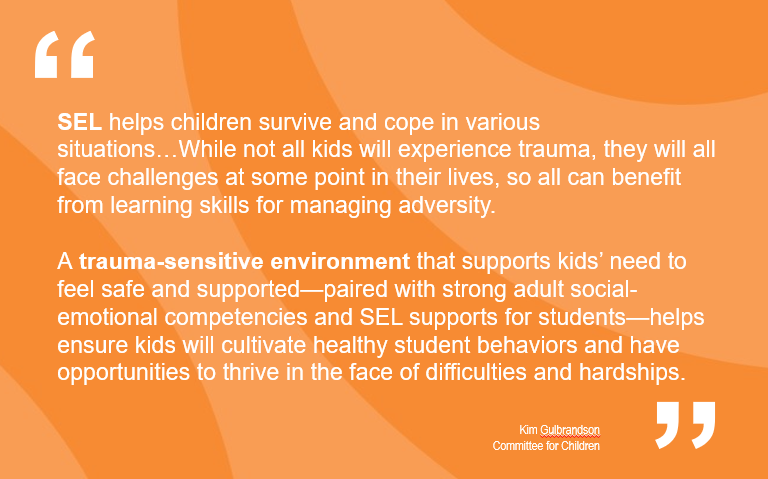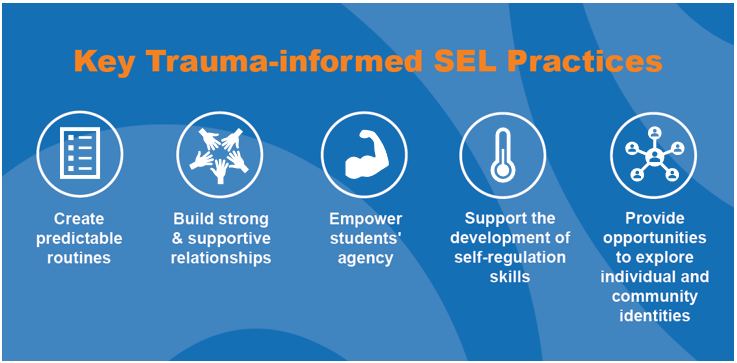Trauma-informed Social & Emotional Learning
- Stephanie Williams

- May 8, 2023
- 3 min read
Trauma-informed education is a holistic approach to education that takes into account the impact of trauma on students' behaviour, learning, relationships and overall well-being. It is an approach that supports all students but is particularly inclusive and responsive to students who have experienced trauma. Trauma can include experiences such as abuse, neglect, violence, or natural disasters, and can have a profound impact on a child's mental and emotional health. Social-emotional learning (SEL) plays a significant role in achieving the goals of trauma-informed education by acknowledging the role of trauma in shaping a child's experiences and seeking to create a safe and supportive environment in which they can heal and thrive.
Traumatic experiences can negatively impact learning, behaviour and relationships at school and a trauma-informed SEL approach can have a positive impact on both students and educators. Trauma resulting from overwhelming experiences has the power to disturb students’ development of some essential foundations for learning, and such an approach can support students in building the skills they need to overcome these disturbances. It can also assist educators in understanding the underlying messages or reasons behind students’ difficulties in learning and behaviour.
Trauma-informed SEL aims to create stable learning environments where students who have experienced trauma and adversities can develop positive and meaningful relationships with adults and peers in which they feel supported and connected. Students are encouraged to explore their strengths and identities through exercising their own agency whilst having access to the mental health supports they need. And in large part, a trauma-informed approach helps students focus on building the self-regulation skills necessary to navigate challenges.

In order for schools to provide children with the necessary support and prevent retraumatisation in the school setting, it is critical for educators to respond to dysregulated behaviour through a trauma lens.
Self-regulation plays a critical role in an individual’s response to trauma. Students with trauma often struggle with self-regulation skills such as emotion management and executive function. Whether the trauma is social, emotional, psychological or physical, the effect on the brain is similar. The brain adapts to protect itself from the stress that trauma produces. Certain parts of the brain are placed on high alert, while other parts become much less active. This has significant impact on a child’s ability to control emotions, stay calm, pay attention, be less impulsive and form healthy relationships. Even seemingly ordinary events, like sitting in a classroom, can be very challenging for a child that has experienced the effects of trauma. Helping students develop their self-regulation skills through adult role modelling and explicit teaching can help.
One key aspect of trauma-informed SEL is building a sense of trust and safety in the classroom. This can include creating a predictable and consistent routine, providing clear and consistent rules and expectations, and fostering open communication and collaboration among students and teachers. It also means recognising that students may have different needs and coping mechanisms and being willing to adjust teaching strategies and approaches as needed.

Another important aspect of trauma-informed SEL is teaching students the skills they need to manage their emotions and behaviours in a healthy way. This can include teaching them about mindfulness and self-regulation, as well as providing opportunities for them to practice these skills in the classroom. Additionally, educators can provide students with tools and strategies to help them cope with difficult emotions and experiences, such as journaling, art therapy, and social-emotional learning activities.
Additionally, it is important for educators to understand the impact of their own experiences and biases on their interactions with students and to strive for cultural humility. It is important to provide the appropriate resources and support for students from diverse backgrounds, who may have different experiences of trauma.
Incorporating trauma-informed SEL into the classroom can have a positive impact on students' overall well-being and academic success. By creating a safe and supportive learning environment and teaching students the skills they need to manage their emotions and behaviours, educators can help students heal from past traumas and build resilience for the future.
Prevention of retraumatisation in the school setting is also an important aspect of trauma-informed SEL. Implementing an evidence-based bullying prevention program that teaches explicity bullying prevention skills to all students can solidify a culture within the school where students feel safe and supported amidst peers and adults alike.
In conclusion, Trauma-informed SEL is a crucial approach to education that acknowledges the impact of trauma on students' behaviour, learning, and overall well-being. It aims to create a safe and supportive environment that can help students heal and thrive. By providing students with tools and strategies to help them cope with difficult emotions and experiences and by understanding the impact of their own experiences and biases, educators can play a vital role in helping students overcome past traumas and build resilience for the future.
Positive Pieces Education is the Australian and New Zealand publisher of the Second Step social-emotional learning program. Learn more




Comments